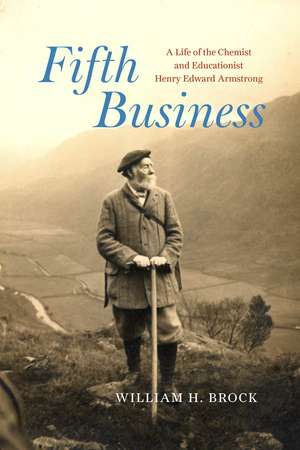Fifth Business: A Life of the Chemist and Educationist Henry Edward Armstrong: Synthesis
Autor William H Brocken Limba Engleză Hardback – 5 iun 2025
Fifth Business is a biography of the English chemist, educator, and scientific critic Henry Edward Armstrong. Today, Armstrong, who was a central figure in the development of the science of chemistry between 1885 and 1914, is more remembered for his campaigns to improve the teaching of chemistry, and science generally, and less for his theory of residual affinity and reverse electrolysis—or his hostility toward physical chemistry. However, right up until his retirement, Armstrong was a significant and prolific organic chemist, as well as a major figure in the academic and social life of the Chemical Society.
Fifth Business is structured as chronologically as possible, with Armstrong’s life and achievements as an active chemist in Part I (1848–1911) and as a critic in his long retirement in Part II (1911–1937). Brock’s authoritative biography provides a unique inside look at its subject, allowing us to better understand the history of British science, scientific institutions, scientific education, pedagogical theory, and social relations of science during the last third of the nineteenth century and the first third of the twentieth.
Preț: 301.41 lei
Nou
Puncte Express: 452
Preț estimativ în valută:
57.67€ • 60.22$ • 47.73£
57.67€ • 60.22$ • 47.73£
Carte nepublicată încă
Doresc să fiu notificat când acest titlu va fi disponibil:
Se trimite...
Preluare comenzi: 021 569.72.76
Specificații
ISBN-13: 9780226839585
ISBN-10: 0226839583
Pagini: 352
Ilustrații: 10 halftones
Dimensiuni: 152 x 229 mm
Greutate: 0.45 kg
Ediția:First Edition
Editura: University of Chicago Press
Colecția University of Chicago Press
Seria Synthesis
ISBN-10: 0226839583
Pagini: 352
Ilustrații: 10 halftones
Dimensiuni: 152 x 229 mm
Greutate: 0.45 kg
Ediția:First Edition
Editura: University of Chicago Press
Colecția University of Chicago Press
Seria Synthesis
Notă biografică
William H. Brock is emeritus professor of the history of science at the University of Leicester. He is the author of several books, among them, The History of Chemistry: A Very Short Introduction; William Crookes (1832–1919) and the Commercialization of Science; Justus Von Liebig: The Chemical Gatekeeper; Science for All: Studies in the History of Victorian Science and Education; and The Norton History of Chemistry.
Cuprins
Notes on Abbreviations, References, Bibliographies, and Illustrations
Preface
Part I
One. Becoming a Chemist
Two. Cobbling a Career in London
Three. Finsbury College
Four. The Central Chemist
Five. Chemical Research at the Central Technical College
Six. Running the Chemical Society
Seven. The Admission of Women into the Chemical Society
Eight. The Heuristic Method
Nine. Ionomania
Part II
Ten. Semi-Retirement
Eleven. The Great War
Twelve. Heurism Denigrated
Thirteen. The 1920s
Fourteen. Campaigns Old and New
Fifteen. The Lewis Carroll of Chemistry
Sixteen. The Final Years
Conclusions
Acknowledgments
Archives Consulted
Cited Works by Henry Edward Armstrong
General Bibliography
Index
Preface
Part I
One. Becoming a Chemist
Two. Cobbling a Career in London
Three. Finsbury College
Four. The Central Chemist
Five. Chemical Research at the Central Technical College
Six. Running the Chemical Society
Seven. The Admission of Women into the Chemical Society
Eight. The Heuristic Method
Nine. Ionomania
Part II
Ten. Semi-Retirement
Eleven. The Great War
Twelve. Heurism Denigrated
Thirteen. The 1920s
Fourteen. Campaigns Old and New
Fifteen. The Lewis Carroll of Chemistry
Sixteen. The Final Years
Conclusions
Acknowledgments
Archives Consulted
Cited Works by Henry Edward Armstrong
General Bibliography
Index
Recenzii
“Brock has turned his scholarly focus to Henry Armstrong and restored him to his rightful position as a leading organic chemist as well as an innovator in science education. Drawing on Armstrong’s own words has provided a deeper insight into his character and revealed his wider concerns for the environment and farming.”
“With this wonderful study of the irascible and controversial chemist Henry Armstrong, Brock adds a further figure to his other biographies of nineteenth- and twentieth-century chemists. As Brock makes clear, Armstrong’s significance lies in his close involvement with a large number of scientific institutions through which he promoted his ideas on science education and the place of science in society. By writing this biography, Brock has done an invaluable service to the history of science by rescuing a major figure from undeserved obscurity.”















